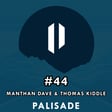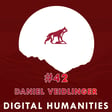
#26 - Web3 Gaming and Composable MMOs with Steve Wade
Steve Wade is the CEO of Midnight Evergreen, a web3 gaming company creating deconstructed MMO experiences. Steve started his career as an eSports player and built a digital currency in 2005.
Steve's Early Days
In 2005, Steve created a digital currency called the Zyon token, which was used internally by game developers. This innovative system allowed developers to exchange their time and skills within a collaborative environment, though it faced legal challenges due to labor laws. Despite this early setback, Wade's passion for digital economies persisted, leading him to further explore the potential of blockchain in gaming.
Steve's early experience as an eSports player and deep understanding of digital economies laid the foundation for Midnight Evergreen.
At Midnight Evergreen, Wade envisions a new genre of MMOs that deconstruct traditional gaming elements into standalone experiences, all interconnected through a central social hub, Evergreen. This approach allows for diverse gameplay experiences while maintaining a cohesive ecosystem.
One of the unique aspects of Midnight Evergreen is its embrace of bots. Players can earn or purchase bots, which can then be used to farm resources across different games within the ecosystem. This innovative approach aligns with Wade's belief in the value of participation over mere ownership in Web3 environments.
Building the Evergreen Ecosystem
Evergreen serves as the social hub connecting all of Midnight Evergreen's games. By breaking down an MMO into various mini-games such as fishing, racing, or house decorating, each with its own standalone appeal, the ecosystem allows for a more dynamic and interconnected gaming experience. These games, while independent, contribute to the overall narrative and player progression within the MMO.
Wade emphasizes the importance of community and player-driven economies. Players can trade items across games, creating a circular economy that enhances the longevity and engagement of each title. This system not only enriches the player experience but also sustains the game's lifecycle beyond the typical three to six months seen in many modern games.
Focus on Double-A Games
Midnight Evergreen's strategy focuses on developing double-A (AA) games, which strike a balance between indie and triple-A (AAA) titles in terms of budget and production quality. These games, with budgets ranging from $1 million to $5 million, aim to deliver high-quality experiences without the excessive costs associated with AAA titles. By partnering with specialized studios, Midnight Evergreen can produce a variety of games efficiently and cost-effectively.
Community and Governance
Community involvement is central to Midnight Evergreen's vision. The company plans to implement a governance system where the community can vote on which games to develop next, using a token-based voting mechanism. This democratized approach leverages the collective wisdom of the gaming community to identify potential hits and ensure that the games developed resonate with the audience.
Future Prospects and Industry Trends
Looking ahead, Wade sees the future of gaming as one where the distinction between Web2 and Web3 blurs, with live service games incorporating elements of both. He believes that the ability for players to participate in and contribute to the game's ecosystem will become a standard expectation.
This podcast is fueled by Aesir, the smartest crypto trading bot platform on the market. Sign up and use code AESIRPOT20 at checkout for 20% OFF your subscription.



















